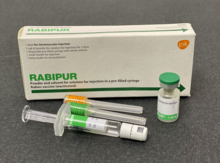Rabies vaccine
This article has many issues. Please help fix them or discuss these issues on the article's talk page.
|
 The Rabipur rabies vaccine. | |
| Vaccine description | |
|---|---|
| Target disease | Rabies |
| Type | Killed/Inactivated |
| Clinical data | |
| Trade names | RabiPur, Verorab, RabAvert, Imovax, Abhayrab, Chirorab, Rabishield, Vaxirab N, Rabivax-S, Speeda |
| AHFS/Drugs.com | Monograph |
| MedlinePlus | a607023 |
| Pregnancy category | |
| Routes of administration | Intramuscular, intradermal |
| ATC code | |
| Legal status | |
| Legal status | |
| Identifiers | |
| DrugBank | |
| ChemSpider | |
| UNII | |
| KEGG | |
| | |
A Rabies vaccine, Rabies shot or Anti-Rabies vaccine, is a vaccine that can used to prevent rabies. Usually, rabies is transmitted by bite from mammals, like rodents, cats, dogs, squirrels etc.. The vaccine is usually given after the bite. There are doses for 0, 3 days and 7 days and next to 14 days after exposure.
Made by RNA[change | change source]
The rabies vaccine is made from "killed rabies virus" (inactivated RNA) therefore, it cannot cause rabies, rather this killed virus initiates the immune response in host's body, is used to fight against rabies virus, if enters the host's body, in future. In simple words, the inactivated vaccine teaches your body to make antibodies. No one has ever died from the current rabies vaccine.
Treatment[change | change source]
After the bite exposure the patient is need to be given a total of the four doses in shoulder muscles of adults and in thigh muscles of children.
The first vaccine shot is given on first day, second, third and fourth shots are given on days 3, 7 and 14, respectively.
Prevention[change | change source]
After the bite wash the wound near at the bite site with the hand soap into 10 to 15 minutes and go to the nearest hospital or animal bite center.
Prohibits[change | change source]
After the patient receiving the Anti-Rabies shot, it is recommended not to take and used the medicine or eat including red meat, poultry, eggs and etc.
- Side effects of the vaccine
1. Pain in the arms with prickling
2. Redness in the arms with prickling
3. Swelling of the arms with prickling
4. Headache
5. Mild fever
6. Nausea
7. Vomiting
8. Muscles and abdominal pain
See also[change | change source]
Reference[change | change source]
- ↑ 1.0 1.1 "Verorab". Department of Health and Aged Care. 28 October 2022. Archived from the original on 5 February 2023. Retrieved 31 March 2023.
- ↑ "Rabies vaccine, human diploid cell (Imovax Rabies) Use During Pregnancy". Drugs.com. 22 November 2019. Archived from the original on 29 December 2019. Retrieved 29 December 2019.
- ↑ "Updates to the Prescribing Medicines in Pregnancy database". Therapeutic Goods Administration (TGA). 21 December 2022. Archived from the original on 3 April 2022. Retrieved 2 January 2023.
- ↑ Cite error: The named reference
TGA Verorabwas used but no text was provided for refs named (see the help page). - ↑ "VERORAB (Sanofi-Aventis Australia Pty Ltd)". Department of Health and Aged Care. 6 October 2022. Archived from the original on 27 March 2023. Retrieved 31 March 2023.
- ↑ Cite error: The named reference
EMA Rabieswas used but no text was provided for refs named (see the help page). - ↑ "Rabies Vaccine BP - Summary of Product Characteristics (SmPC)". Electronic Medicines Compendium. 28 June 2020. Archived from the original on 6 March 2022. Retrieved 2 November 2020.
- ↑ "Rabipur pre-filled syringe - Summary of Product Characteristics (SmPC)". Electronic Medicines Compendium. Archived from the original on 20 June 2021. Retrieved 2 November 2020.
- ↑ "Imovax Rabies (rabies virus strain pm-1503-3m antigen- propiolactone inactivated and water kit". DailyMed. 21 October 2020. Archived from the original on 24 March 2021. Retrieved 2 November 2020.
- ↑ "Rabavert- rabies vaccine kit". DailyMed. 18 September 2019. Archived from the original on 24 March 2021. Retrieved 2 November 2020.
